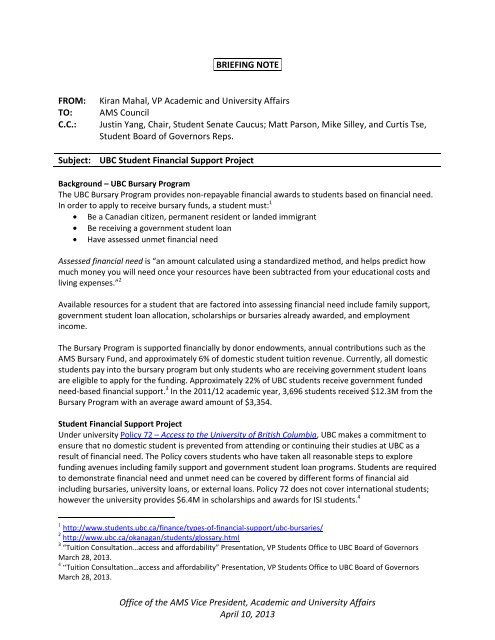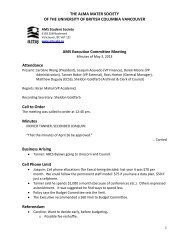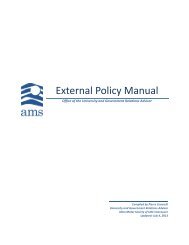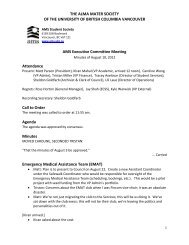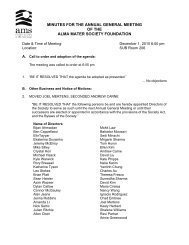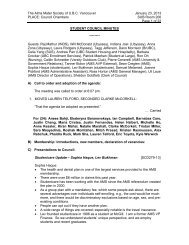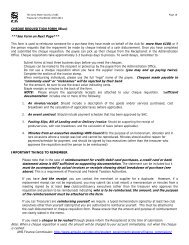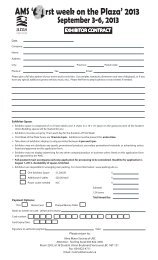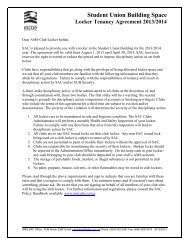UBC Student Financial Support Project - University of British Columbia
UBC Student Financial Support Project - University of British Columbia
UBC Student Financial Support Project - University of British Columbia
Create successful ePaper yourself
Turn your PDF publications into a flip-book with our unique Google optimized e-Paper software.
BRIEFING NOTE<br />
FROM:<br />
TO:<br />
C.C.:<br />
Kiran Mahal, VP Academic and <strong>University</strong> Affairs<br />
AMS Council<br />
Justin Yang, Chair, <strong>Student</strong> Senate Caucus; Matt Parson, Mike Silley, and Curtis Tse,<br />
<strong>Student</strong> Board <strong>of</strong> Governors Reps.<br />
Subject: <strong>UBC</strong> <strong>Student</strong> <strong>Financial</strong> <strong>Support</strong> <strong>Project</strong><br />
Background – <strong>UBC</strong> Bursary Program<br />
The <strong>UBC</strong> Bursary Program provides non-repayable financial awards to students based on financial need.<br />
In order to apply to receive bursary funds, a student must: 1<br />
• Be a Canadian citizen, permanent resident or landed immigrant<br />
• Be receiving a government student loan<br />
• Have assessed unmet financial need<br />
Assessed financial need is “an amount calculated using a standardized method, and helps predict how<br />
much money you will need once your resources have been subtracted from your educational costs and<br />
living expenses.” 2<br />
Available resources for a student that are factored into assessing financial need include family support,<br />
government student loan allocation, scholarships or bursaries already awarded, and employment<br />
income.<br />
The Bursary Program is supported financially by donor endowments, annual contributions such as the<br />
AMS Bursary Fund, and approximately 6% <strong>of</strong> domestic student tuition revenue. Currently, all domestic<br />
students pay into the bursary program but only students who are receiving government student loans<br />
are eligible to apply for the funding. Approximately 22% <strong>of</strong> <strong>UBC</strong> students receive government funded<br />
need-based financial support. 3 In the 2011/12 academic year, 3,696 students received $12.3M from the<br />
Bursary Program with an average award amount <strong>of</strong> $3,354.<br />
<strong>Student</strong> <strong>Financial</strong> <strong>Support</strong> <strong>Project</strong><br />
Under university Policy 72 – Access to the <strong>University</strong> <strong>of</strong> <strong>British</strong> <strong>Columbia</strong>, <strong>UBC</strong> makes a commitment to<br />
ensure that no domestic student is prevented from attending or continuing their studies at <strong>UBC</strong> as a<br />
result <strong>of</strong> financial need. The Policy covers students who have taken all reasonable steps to explore<br />
funding avenues including family support and government student loan programs. <strong>Student</strong>s are required<br />
to demonstrate financial need and unmet need can be covered by different forms <strong>of</strong> financial aid<br />
including bursaries, university loans, or external loans. Policy 72 does not cover international students;<br />
however the university provides $6.4M in scholarships and awards for ISI students. 4<br />
1 http://www.students.ubc.ca/finance/types-<strong>of</strong>-financial-support/ubc-bursaries/<br />
2 http://www.ubc.ca/okanagan/students/glossary.html<br />
3 “Tuition Consultation…access and affordability” Presentation, VP <strong>Student</strong>s Office to <strong>UBC</strong> Board <strong>of</strong> Governors<br />
March 28, 2013.<br />
4 “Tuition Consultation…access and affordability” Presentation, VP <strong>Student</strong>s Office to <strong>UBC</strong> Board <strong>of</strong> Governors<br />
March 28, 2013.<br />
Office <strong>of</strong> the AMS Vice President, Academic and <strong>University</strong> Affairs<br />
April 10, 2013
In the last academic year, the <strong>UBC</strong> Board <strong>of</strong> Governors began a conversation around the application <strong>of</strong><br />
Policy 72 in practice. The BoG asked whether financial aid was being allocated to the students in the<br />
most need <strong>of</strong> financial resources. The response to this question is that it cannot be determined for<br />
certain, because only students receiving government student loans are eligible to receive bursary funds.<br />
While students on student loans have financial need, there may be many other students who are not<br />
participating in the government student loan program who also have similar if not greater unmet<br />
financial need.<br />
In addition to the allocation <strong>of</strong> financial support, there was also an audit <strong>of</strong> the student financial support<br />
process that identified risks in the management <strong>of</strong> data maintained for awards. This pointed towards a<br />
need for the improvement <strong>of</strong> data management systems.<br />
The <strong>Student</strong> <strong>Financial</strong> <strong>Support</strong> <strong>Project</strong> stemmed from these discussions between the Board <strong>of</strong> Governors<br />
and Enrolment Services regarding allocations <strong>of</strong> both merit based and needs based financial aid to <strong>UBC</strong><br />
students. The result <strong>of</strong> these conversations pointed towards a need to ensure that the financial aid<br />
process was opened up to all students who demonstrated financial need.<br />
Scope <strong>of</strong> <strong>Project</strong><br />
The systems and process improvement will cover university and external awards for graduate and<br />
undergraduate students, domestic and international. This will include merit based scholarships and<br />
needs based bursaries as well as student loan programs.<br />
Vision <strong>of</strong> <strong>Project</strong><br />
“Provide adequate student financial support to ensure financially challenged students have access to the<br />
whole <strong>UBC</strong> experience - a goal outlined in <strong>UBC</strong>’s Place and Promise.”<br />
The <strong>Student</strong> <strong>Financial</strong> <strong>Support</strong> <strong>Project</strong> plans to work towards this vision by:<br />
• Simplifying the processes involved with applying for and allocating financial aid<br />
• Offering merit and needs based awards earlier, giving student more time to plan<br />
• Offering comprehensive financial packages to students upon admission<br />
• Recognizing and taking into account the real cost <strong>of</strong> living in Vancouver and Kelowna and<br />
attending <strong>UBC</strong> in assessing financial need<br />
Opening Up <strong>Financial</strong> Aid Process<br />
Currently, the university relies on the government student loan program to review a student’s financial<br />
situation and determine whether an individual student demonstrates financial need. Because <strong>UBC</strong> does<br />
not have the systems or processes in place to assess financial need in-house, <strong>UBC</strong> has been thus far<br />
unable to open up the bursary program to students who are not enrolled in the government student<br />
loan program.<br />
This project will allow the university to build the infrastructure to enable all students to complete a<br />
financial pr<strong>of</strong>ile upon admission, and throughout the course <strong>of</strong> their degree, to submit necessary<br />
information to assess a student’s financial need. Based on the information collected through the<br />
financial pr<strong>of</strong>ile, Enrolment Services will be able to provide students with a financial package based on<br />
their unmet need with their admissions <strong>of</strong>fer or by late May for continuing students. This process will<br />
provide financial certainty to student enabling them to accurately plan ahead for their academic year at<br />
<strong>UBC</strong>.<br />
Office <strong>of</strong> the AMS Vice President, Academic and <strong>University</strong> Affairs<br />
April 10, 2013
In order to accurately assess student unmet need, the project will also work to develop a financial need<br />
assessment system that takes into account the real costs <strong>of</strong> attending <strong>UBC</strong> in Vancouver and Kelowna.<br />
The project will also create <strong>UBC</strong> specific student/parental contribution tables taking into account the<br />
unique situations <strong>of</strong> <strong>UBC</strong> students. The system will be integrated with the awards system to account for<br />
scholarships, merit based awards, external bursaries or <strong>UBC</strong> employment income allowing for a more<br />
accurate picture <strong>of</strong> a student’s financial situation.<br />
Through creating a <strong>UBC</strong> specific assessment tools that is openly communicated to the <strong>UBC</strong> community,<br />
the project will aim to increase the transparency in the financial aid allocation process. <strong>Student</strong> will be<br />
able to understand why they have received a certain amount <strong>of</strong> funding with assurance that funding is<br />
being allocated to students with the most need.<br />
Streamlining Merit Based Award Adjudication<br />
In the preliminary stages <strong>of</strong> this project, Enrolment Services mapped out process management for all<br />
<strong>UBC</strong> scholarships and external awards to identify areas for improvement and increased efficiency. This<br />
project will work to improve the processes for adjudicating merit based awards. This past year, major<br />
entrance scholarship applications were integrated into the <strong>UBC</strong> student application process. This move<br />
linked the MES to the personal pr<strong>of</strong>ile process <strong>of</strong> Broad Based Admissions effectively making all students<br />
eligible to be considered for a MES. In the past, students were nominated for MES by their secondary<br />
school. This process enabled students to receive notice awarding <strong>of</strong> a MES along with their admissions<br />
<strong>of</strong>fer. There is currently a project in developed to integrate the student housing application with this<br />
process with an aim to work towards a consolidated <strong>of</strong>fer system where, along with their admissions<br />
<strong>of</strong>fer, student receive <strong>of</strong>fer for merit based scholarships, financial aid and on-campus housing.<br />
For continuing students, the merit based process will be improved by utilizing the new awards system to<br />
identify candidate, consolidate adjudication committee scores, verify eligibility, and generate <strong>of</strong>fers.<br />
There is also an opportunity to explore the creation <strong>of</strong> a database that outlines the different internal<br />
<strong>UBC</strong> awards available to continuing students.<br />
Office <strong>of</strong> the AMS Vice President, Academic and <strong>University</strong> Affairs<br />
April 10, 2013
<strong>Student</strong> Experience Summary 5<br />
New <strong>Student</strong>s:<br />
Continuing <strong>Student</strong>s:<br />
5 Figures obtained from <strong>Student</strong> <strong>Financial</strong> <strong>Support</strong> <strong>Project</strong> Director, Barbara Crocker<br />
Office <strong>of</strong> the AMS Vice President, Academic and <strong>University</strong> Affairs<br />
April 10, 2013
Summary <strong>of</strong> Benefits<br />
- Review comprehensive financial package with merit based and needs based awards annually<br />
allowing for financial certainty<br />
- Process will be publically communicated and transparent<br />
- Allocation <strong>of</strong> financial aid to neediest students first<br />
- <strong>UBC</strong> specific bursary process de-linked from student loan system<br />
- <strong>UBC</strong> specific cost <strong>of</strong> living and contribution assessment tools<br />
- Emergency funding still available to all students<br />
- Streamlined operations and processes for all awards<br />
- Derivation <strong>of</strong> maximum benefit to students from financial aid and awards budget<br />
Progress to Date<br />
Funding to support the undertaking <strong>of</strong> this project was approved by the <strong>UBC</strong> VP Finance in December<br />
2012. The project underwent a Request for Proposal process to select a vendor to design the systems for<br />
the project from January-March. The vendor team will begin to design the systems in May 2013 with an<br />
estimated project completion date <strong>of</strong> March 2015.<br />
Consultation<br />
Over the last academic year, Enrolment Services engaged in consultation with the AMS and GSS<br />
executives to discuss the project vision and scope to develop an ideal future state for financial support<br />
at <strong>UBC</strong>. This feedback was taken into account when designing the proposal taken to the university<br />
executive for approval. A presentation about the project was made to AMS council on January 23 rd 2013.<br />
At this presentation, Barbara Crocker indicated that over the next academic year there would be further<br />
engagement with the AMS and GSS in designing the systems and financial pr<strong>of</strong>ile as well as broader<br />
student consultation and communication.<br />
Issues and Opportunities for Consideration<br />
Development <strong>of</strong> <strong>UBC</strong> Specific Cost and Contribution Assessment Tools<br />
A key part <strong>of</strong> the infrastructure design will include developing a financial need assessment tool based on<br />
the real costs <strong>of</strong> attending <strong>UBC</strong> Vancouver and <strong>UBC</strong> Okanogan. This presents an opportunity for the AMS<br />
to take part in shaping this cost <strong>of</strong> living table on an annual basis to reflect the cost <strong>of</strong> education for<br />
students. This also presents a very exciting opportunity to finally define what affordable housing is for<br />
students, something that has come up numerous times in our work around advocating for affordable<br />
housing options on-campus.<br />
In addition to developing a cost <strong>of</strong> living assessment, the process will also develop a student/parental<br />
contribution table. An issue that has surfaced many times in relation to the student loan allocation<br />
process is whether the expected parental contributions are realistic. This process will allow students to<br />
voice their views on setting realistic family contribution expectations.<br />
Changes to Process and Allocations<br />
With the changes being implemented through this project, the financial aid process will be opened up to<br />
all students, but the pool <strong>of</strong> funds in the financial aid pool will remain the same. As a result, some<br />
students will not receive as much money as they have received in the past. There are many issues that<br />
may arise from this, but it is important to realize that this process will strive to fill unmet need <strong>of</strong><br />
students with the greatest demonstrated need first and work its way up. Although certain students will<br />
receive less money than before, others who previously received no institutional support will know be<br />
Office <strong>of</strong> the AMS Vice President, Academic and <strong>University</strong> Affairs<br />
April 10, 2013
eligible to receive funds. That being said, <strong>UBC</strong>’s administration has assured us that emergency funds will<br />
still be available to students.<br />
With this new system, the allocation process will be made much more transparent and the AMS and<br />
<strong>UBC</strong> will have to continue working together to ensure that the correct information is sent out to<br />
students about the process. These changes also present an opportunity to improve communication to<br />
current and prospective students about the financial aid systems available to them in funding their<br />
education at <strong>UBC</strong>.<br />
Merit Based Scholarship Database<br />
The university <strong>of</strong>fers many merit based scholarships to continuing students. Through the mapping<br />
exercise employed in preliminary stages <strong>of</strong> this project, a lot <strong>of</strong> data was collected on these awards. This<br />
data could be leveraged to develop a comprehensive merit scholarship database for all students to<br />
access information about scholarships they may be eligible for while continuing their studies at <strong>UBC</strong>.<br />
This is currently not explicitly in the scope <strong>of</strong> the project, but provides an interesting opportunity to<br />
explore. This could potentially makes the merit based scholarship process more open and accessible to<br />
all students, a system that is currently based heavily on faculty or staff recommendations.<br />
Revision <strong>of</strong> Policy 72<br />
The implementation <strong>of</strong> this project will likely require that revisions be made to university Policy 72. This<br />
presents a very exciting opportunity for students to help shape the way financial aid and access to <strong>UBC</strong><br />
will be structured for the near future. The current policy is heavily focused on domestic student aid, and<br />
international students have expressed a desire for the university to do more in enabling students to<br />
continue their studies at <strong>UBC</strong>. The AMS and the ISA can work closely through this revision process to<br />
suggest new systems to support international students.<br />
External Advocacy<br />
This project shows <strong>UBC</strong>’s commitment to do the most that it can with what it has to improve access and<br />
affordability for students. This re-affirms the need for the provincial government to step up and commit<br />
to doing the same for BC students.<br />
Recommendation to Committee<br />
We recommend that the committee pass a motion in support <strong>of</strong> the project undertaken by the<br />
university and express the AMS’ interest in being involved with the opportunities that this project<br />
presents for improving the <strong>UBC</strong> experience for all students.<br />
Office <strong>of</strong> the AMS Vice President, Academic and <strong>University</strong> Affairs<br />
April 10, 2013
Draft Wording for Policy Motion<br />
Whereas the AMS recognizes that accessibility and affordability are key issues impacting current and<br />
prospective <strong>UBC</strong> students;<br />
Whereas the university has committed to undertaking a student financial support project that aims to<br />
improve the systems and processes associated with the allocation <strong>of</strong> merit based and needs based<br />
awards at <strong>UBC</strong>;<br />
Whereas this project provides many benefits to student including: the <strong>of</strong>fering <strong>of</strong> comprehensive<br />
financial packages; greater transparency in financial aid allocation; <strong>UBC</strong> specific cost assessment and<br />
contribution tools;<br />
BIRT the AMS formally supports the vision and goals <strong>of</strong> the <strong>Student</strong> <strong>Financial</strong> <strong>Support</strong> <strong>Project</strong>;<br />
BIFRT the AMS encourages the university to engage in on-going student consultation in the<br />
development, design, implementation and communication <strong>of</strong> the project.<br />
Office <strong>of</strong> the AMS Vice President, Academic and <strong>University</strong> Affairs<br />
April 10, 2013


